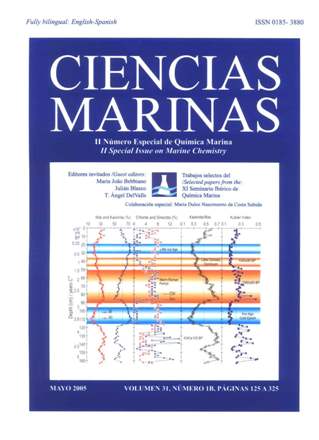Fe, Zn, Cu and Cd concentrations in the digestive gland and muscle tissues of Octopus vulgaris and Sepia officinalis from two coastal areas in Portugal
Main Article Content
Abstract
Concentrations of Fe, Zn, Cu and Cd were measured in the mantle, arm and digestive gland of Octopus vulgaris (Cuvier, 1797) and in the mantle and digestive gland of Sepia officinalis (Linnaeus, 1758) captured at two sites on the Portuguese coast during 2001. The most abundant element was Zn, reaching 121 µg g–1 in muscle tissues; Fe and Cu presented a similar range of concentration, 5.4–81 µg g–1 and 3.3–72 µg g–1, respectively; and Cd varied between 0.010 and 3.3 µg g–1. Metal concentrations in the digestive gland were two and three orders of magnitude higher than those recorded in the mantle and arm. The relationship between metal concentration and body weight was found mainly in the digestive gland and rarely in the mantle and arm. The Cd:Zn and Cd:Cu ratios were particularly high in the digestive gland of the two species captured at the most contaminated site and presented positive linear relationships with the body weight. This suggests a progressive accumulation of Cd in the digestive gland of octopus and cuttlefish with growth, in comparison to the essential elements Zn and Cu.
Downloads
Article Details

This work is licensed under a Creative Commons Attribution 4.0 International License.
This is an open access article distributed under a Creative Commons Attribution 4.0 License, which allows you to share and adapt the work, as long as you give appropriate credit to the original author(s) and the source, provide a link to the Creative Commons license, and indicate if changes were made. Figures, tables and other elements in the article are included in the article’s CC BY 4.0 license, unless otherwise indicated. The journal title is protected by copyrights and not subject to this license. Full license deed can be viewed here.

